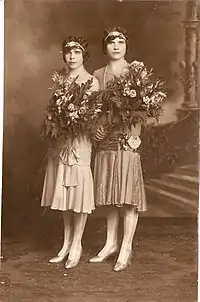إشبينة
Arabic

إِشْبِينَتَانِ
Etymology
Borrowed from Classical Syriac ܫܰܘܫܒܺܝܢܬܴܐ (šawšəḇīntā), developed as the feminine form of Classical Syriac ܫܰܘܫܒܺܝܢܳܐ (šawšəḇīnā), from Akkadian 𒋢𒊓𒁉𒉡 (/susapinnu/, “paranymph, friend of the bridegroom in a wedding ceremony”), not attested with feminine equivalent. Ultimately a foreign word, structure suggesting Anatolian, but strangely attested in Hittite as an Akkadogram.
Pronunciation
- IPA(key): /ʔiʃ.biː.na/
Noun
إِشْبِينَة • (ʾišbīna) f (plural إِشْبِينَات (ʾišbīnāt), masculine إِشْبِين (ʾišbīn))
- a woman who is adduced as a witness to a baptism, godfather, baptismal sponsoress
- a woman who is adduced as a witness to a wedding, bridesmaid
Declension
Declension of noun إِشْبِينَة (ʾišbīna)
| Singular | Masculine | Feminine | ||||
|---|---|---|---|---|---|---|
| basic singular triptote | singular triptote in ـَة (-a) | |||||
| Indefinite | Definite | Construct | Indefinite | Definite | Construct | |
| Informal | إِشْبِين ʾišbīn |
الْإِشْبِين al-ʾišbīn |
إِشْبِين ʾišbīn |
إِشْبِينَة ʾišbīna |
الْإِشْبِينَة al-ʾišbīna |
إِشْبِينَة ʾišbīnat |
| Nominative | إِشْبِينٌ ʾišbīnun |
الْإِشْبِينُ al-ʾišbīnu |
إِشْبِينُ ʾišbīnu |
إِشْبِينَةٌ ʾišbīnatun |
الْإِشْبِينَةُ al-ʾišbīnatu |
إِشْبِينَةُ ʾišbīnatu |
| Accusative | إِشْبِينًا ʾišbīnan |
الْإِشْبِينَ al-ʾišbīna |
إِشْبِينَ ʾišbīna |
إِشْبِينَةً ʾišbīnatan |
الْإِشْبِينَةَ al-ʾišbīnata |
إِشْبِينَةَ ʾišbīnata |
| Genitive | إِشْبِينٍ ʾišbīnin |
الْإِشْبِينِ al-ʾišbīni |
إِشْبِينِ ʾišbīni |
إِشْبِينَةٍ ʾišbīnatin |
الْإِشْبِينَةِ al-ʾišbīnati |
إِشْبِينَةِ ʾišbīnati |
| Dual | Masculine | Feminine | ||||
| Indefinite | Definite | Construct | Indefinite | Definite | Construct | |
| Informal | إِشْبِينَيْن ʾišbīnayn |
الْإِشْبِينَيْن al-ʾišbīnayn |
إِشْبِينَيْ ʾišbīnay |
إِشْبِينَتَيْن ʾišbīnatayn |
الْإِشْبِينَتَيْن al-ʾišbīnatayn |
إِشْبِينَتَيْ ʾišbīnatay |
| Nominative | إِشْبِينَانِ ʾišbīnāni |
الْإِشْبِينَانِ al-ʾišbīnāni |
إِشْبِينَا ʾišbīnā |
إِشْبِينَتَانِ ʾišbīnatāni |
الْإِشْبِينَتَانِ al-ʾišbīnatāni |
إِشْبِينَتَا ʾišbīnatā |
| Accusative | إِشْبِينَيْنِ ʾišbīnayni |
الْإِشْبِينَيْنِ al-ʾišbīnayni |
إِشْبِينَيْ ʾišbīnay |
إِشْبِينَتَيْنِ ʾišbīnatayni |
الْإِشْبِينَتَيْنِ al-ʾišbīnatayni |
إِشْبِينَتَيْ ʾišbīnatay |
| Genitive | إِشْبِينَيْنِ ʾišbīnayni |
الْإِشْبِينَيْنِ al-ʾišbīnayni |
إِشْبِينَيْ ʾišbīnay |
إِشْبِينَتَيْنِ ʾišbīnatayni |
الْإِشْبِينَتَيْنِ al-ʾišbīnatayni |
إِشْبِينَتَيْ ʾišbīnatay |
| Plural | Masculine | Feminine | ||||
| basic broken plural diptote | sound feminine plural | |||||
| Indefinite | Definite | Construct | Indefinite | Definite | Construct | |
| Informal | أَشَابِين ʾašābīn |
الْأَشَابِين al-ʾašābīn |
أَشَابِين ʾašābīn |
إِشْبِينَات ʾišbīnāt |
الْإِشْبِينَات al-ʾišbīnāt |
إِشْبِينَات ʾišbīnāt |
| Nominative | أَشَابِينُ ʾašābīnu |
الْأَشَابِينُ al-ʾašābīnu |
أَشَابِينُ ʾašābīnu |
إِشْبِينَاتٌ ʾišbīnātun |
الْإِشْبِينَاتُ al-ʾišbīnātu |
إِشْبِينَاتُ ʾišbīnātu |
| Accusative | أَشَابِينَ ʾašābīna |
الْأَشَابِينَ al-ʾašābīna |
أَشَابِينَ ʾašābīna |
إِشْبِينَاتٍ ʾišbīnātin |
الْإِشْبِينَاتِ al-ʾišbīnāti |
إِشْبِينَاتِ ʾišbīnāti |
| Genitive | أَشَابِينَ ʾašābīna |
الْأَشَابِينِ al-ʾašābīni |
أَشَابِينِ ʾašābīni |
إِشْبِينَاتٍ ʾišbīnātin |
الْإِشْبِينَاتِ al-ʾišbīnāti |
إِشْبِينَاتِ ʾišbīnāti |
References
- “susapinnu”, in The Assyrian Dictionary of the Oriental Institute of the University of Chicago (CAD), volume 15, S, Chicago: University of Chicago Oriental Institute, 1984, page 416
- “šwšbyn”, in The Comprehensive Aramaic Lexicon Project, Cincinnati: Hebrew Union College, 1986–
- Dozy, Reinhart Pieter Anne (1881), “إشبينة”, in Supplément aux dictionnaires arabes (in French), volume 1, Leiden: E. J. Brill, page 724
- Kaufman, Stephen A. (1974) The Akkadian Influences on Aramaic (The Oriental Institute of the University of Chicago Assyriological Studies; 19), Chicago and London: The University of Chicago Press, →ISBN, page 94
- Wehr, Hans; Kropfitsch, Lorenz (1985), “إشبينة”, in Arabisches Wörterbuch für die Schriftsprache der Gegenwart (in German), 5th edition, Wiesbaden: Otto Harrassowitz, published 2011, →ISBN, page 631
This article is issued from Wiktionary. The text is licensed under Creative Commons - Attribution - Sharealike. Additional terms may apply for the media files.